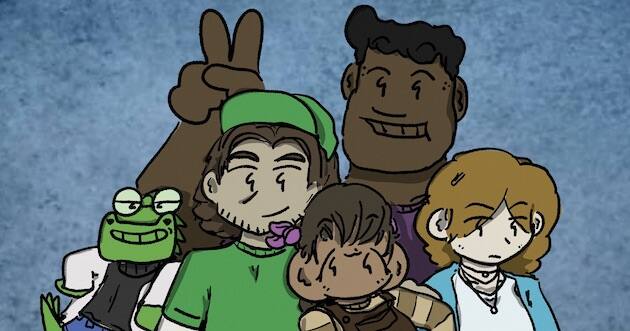Faith-based animated series ‘Fleur De Lis’ is funny

“Fleur de Lis” is a sharp-witted and endearing animated hijinks-adventure sitcom with a Christian worldview and a controversial way it’s made: using artificial intelligence.
Faith-based films and TV shows are not known for their innovation. Between the running gag of faith-based knockoffs of secular content (such as “Revelation Road” being a knockoff of “Mad Max”) and otherwise playing it fairly safe with its inspirational drama formula (like this year’s “Ordinary Angels” and “Unsung Hero”), there’s little to suggest to the average person that faith-based content is pushing the boundaries of creativity.
But “Fleur de Lis” — a TV show on the faith-based streaming platform LOOR — is a rare exception on two fronts. It is not only innovative with the story it tells but how it tells its story — using advancements in AI.
The show is the passion project of Ethan Hill, an Orthodox Christian programmer who made his own video game and graphic novel of this property and characters before deciding to rework it as a TV show. The tale follows husband and wife Aaron and Enoki and their friends Mable (Aaron’s sister) and Scout. Enoki ropes them all into wild schemes to try to earn money to make ends meet in their small town in Louisiana. Along the way, they encounter (and have to fight off) the devil, church-lady Qanon and greedy land developers, while sometimes accidentally gaining superpowers.
“I’ve always wanted to make a TV show, for one, and I have always been very creative,” Hill said. “But I never expected to be able to have the opportunity. And because I’m a software engineer by day — that’s my day job — I have a lot of options available to me to express that. So in the past I’ve worked on — I’ve made books, I’ve made video games and I developed a set of characters that went through a couple of those that I slowly sort of fine-tuned. And then when the time came to make a TV show, I thought, ‘Oh, well I’m going to create a plot that makes the most sense for a television setting, and I’m going to include some characters from some projects I’ve worked on in the past.’”
LOOR is a fitting home for “Fleur de Lis.” It’s a faith-based streaming platform that describes itself as unashamedly trying to create anti-woke Christian content (often describing itself as “based faith films”) and content for the male 18-35 years old (typically overlooked by faith-based film studios). The platform itself is built on a rather innovative business model: It works like a regular subscription-based streaming service, but a portion of your money each month goes to funding the content the subscriber picks. This puts more of the power of determining what movies and shows get made in the hands of the subscribers.

“Fleur de Lis” has a refreshingly wholesome mean-spiritedness to its humor — a cross between animated hits like “Rick and Morty” and “Phineas and Ferb.” Many shows that are harsh with their humor also have an underlying nihilism about life, and many shows that are wholesome — like faith-based content — are very often afraid to get too cruel, and are therefore less funny. But in “Fleur de Lis,” the characters and the plots ruthlessly roast each other, and people frequently get the tar beaten out of them physically and emotionally by life.
These jokes are often really, really funny in the way that harsh jokes typically are. And yet, all of this is in the service of the characters ultimately loving each other and wanting them to succeed. And as much as the show dumps on its characters, it always ultimately validates their values of faith and family.
Another thing that makes this series unique is how it uses its Christian imagination as the basis for the jokes and drama. Typically, faith films will use jokes and drama as a thinly veiled set up for a lesson rather than an end in and of themselves. Meanwhile, secular shows will use their worldview as the set up for the jokes and drama. But for “Fleur de Lis,” the point is the laughter and drama, based on a Christian understanding of the world. The most explicit example of this is the episode “Allons a Crossroads,” where Enoki makes a deal with the devil with chaotic results based on orthodox rather than secular interpretations of Lucifer.
Hill added, “It’s very upsetting to me that a lot of Christian artists believe that they have to choose between sanitizing their work [and being authentic]. I’m going to be honest, to a lot of the world, it rings horribly false when you’re living your life and you have to do a hard turn and say, ‘Oh, yeah, by the way, here’s this Gospel narrative I’m going to tack onto it.’ It feels very forced and acts against the primary narrative, by suggesting that the Christian life isn’t something you can actually walk; it’s something you pretend to do while you’re actually doing something else. And that’s no good.”
The main cast is simple, yet deeply endearing in the tradition of the best cartoon characters. Enoki is often foolish but loving and well meaning. Aaron is passive but responsible and can step up when necessary. Mable is self-absorbed but level headed. And the show develops layers to the characters as the story goes on, such as revealing the tragedy of Enoki’s family history in the season’s final episode.
The show’s animation style — done like scribbles like in “Diary of a Wimpy Kid” and “Scott Pilgrim” — comes to life and is both charming and not at all a distraction. The genre flexibility is also a treat, with one episode feeling like a straight up sitcom and the next having someone get superpowers and fight off a conspiracy.
The show does suffer from some of its limitations. It is made by basically one guy on a limited budget, with his friends as voice actors with a limited number of episodes. The voice acting often sounds stilted and even AI artificial. This frequently ruins the timing of the jokes and creates a barrier between the audience and the relatability of the characters.
The season’s shortness also keeps us from having the time to truly get comfortable with the people and world. Shows that are built around a story arc can afford to have a short season, but ones built around wanting to come back each week to see old friends (such as “The Office,” “Friends” and “How I Met Your Mother”) really need a longer season to really work.
The most controversial aspect of the show has, ironically, nothing to do with the show itself. It’s the fact that the show is made partly using AI. The introduction of artificial intelligence into the TV and film industry has terrified artists for fear it will threaten their jobs as well as take the soul out of the art.
Studios wanting to use AI to make movies more cheaply was a huge part of the recent writers and actors strike — with actors and writers demanding protections from getting their jobs essentially taken over by AI. The amount of AI used doesn’t have to be a lot. “Late Night With The Devil,” for example, was lambasted by creatives online for using AI in three brief still images.
Hill uses AI in minor ways to help with things like backgrounds and altering some voices. So concerns about AI taking the “soul” out of art don’t really apply. But Hill, for his part, argues that concerns about “taking away jobs” using AI are also erroneous because given his budget, without AI, he wouldn’t be able to make it at all.
Regardless of concerns about AI, “Fleur de Lis” remains an entertaining show that is worth watching and supporting for people who want entertainment based deeply in a Christian imagination and who also want the content to be authentically dramatic and funny.
“Fleur de Lis” is available to stream exclusively on LOOR.TV.
– By Joseph Holmes | Reprinted from ReligionUnplugged with permission |Holmes is an award-nominated filmmaker and culture critic living in New York City. He is co-host of the podcast “The Overthinkers” and its companion website theoverthinkersjournal.world, where he discusses art, culture and faith with his fellow overthinkers. His other work and contact info can be found at his website josephholmesstudios.com.






